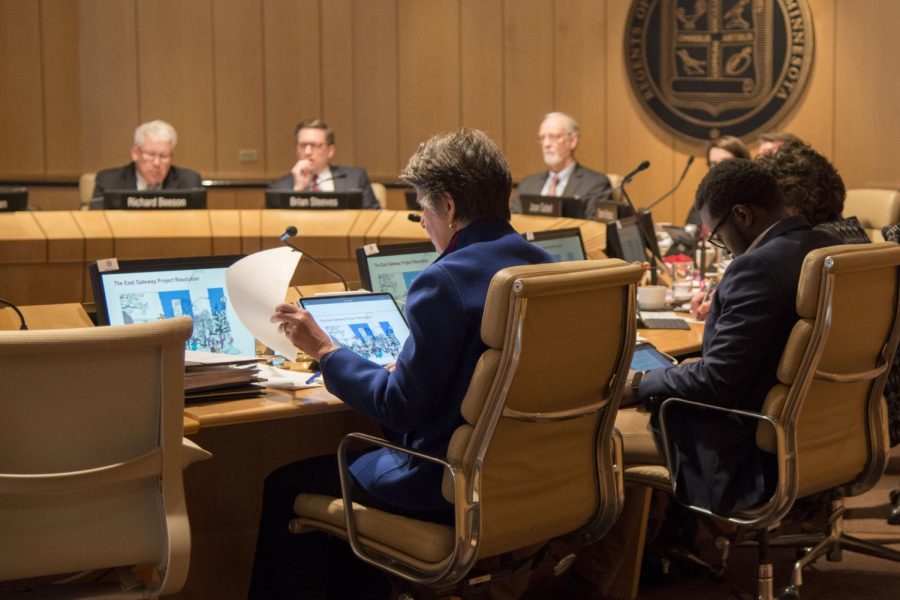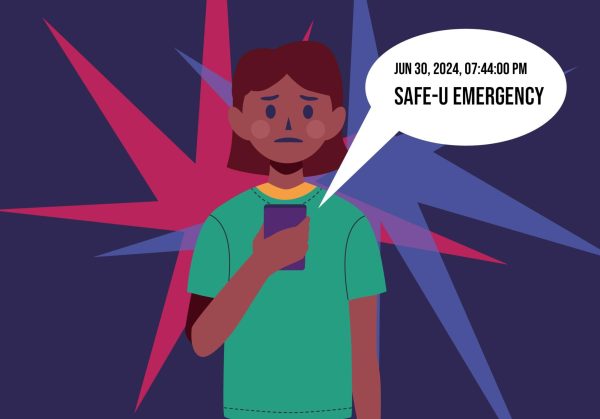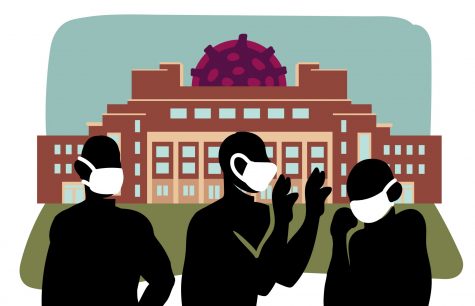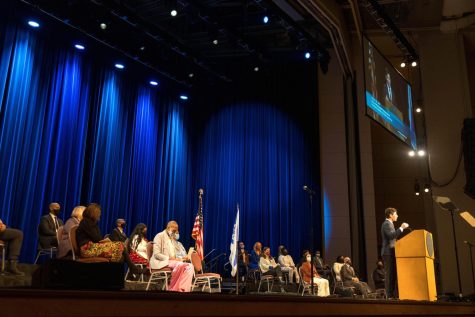Regents discuss eliminating four Gopher sports to recover budget, University finances at September meeting
The board met both in person and remotely.
Image by Emily Urfer
The Board of Regents meet on Friday, Feb. 14. The Board of Regents holds a meeting each month.
The Board of Regents gathered virtually and in person for its September meeting, where they discussed athletics, the pandemic and University of Minnesota finances, among other things. They also approved the appointment of Myron Frans as the incoming senior vice president for finance and operations.
Frans, who previously served Gov. Tim Walz as the commissioner of Minnesota management and budget, will receive an annual salary of $399,000.
Athletics
The board discussed eliminating four sports to help recover budget shortfalls and maintain compliance with Title IX regulations within the athletics department.
Men’s gymnastics, indoor and outdoor track and field, and tennis may be eliminated following the end of their competitive seasons. Fifty-eight student-athletes would be impacted.
“We recognize and deeply respect the disappointment among Gopher Athletics and beyond as a result of these recommendations,” University President Joan Gabel said. “It’s very painful.”
The board also discussed potential pay cuts for some workers and the elimination of eight positions within the athletics department. This option will be further discussed in October, when the board plans to vote. These efforts and more will save the University around $1.3 million, although Gopher Athletics expects to lose around $75 million due to the lack of revenue expected to come in this fiscal year.
The regents considered keeping the four men’s sports if the University could add another women’s sport, something that would help the University stay compliant with Title IX regulations, said Mark Coyle, director of athletics.
“The number of female students as a percentage of the university’s undergraduate enrollment population has increased in recent years. As a result, we need to take steps to ensure ongoing gender equity in our program,” Coyle said. “The elimination of four sports ensures our continued compliance with Title IX, with our participation numbers mirroring the campus population.”
The University currently has a 54% female to 46% male student ratio.
COVID-19 pandemic update
The Mission Fulfillment Committee discussed the impacts of the COVID-19 pandemic, specifically on student enrollment in a meeting held Thursday.
Systemwide, undergraduate enrollment is down by 2.3%, with 42,971 undergraduates enrolled as of Sept. 9. On the Twin Cities campus, undergraduate enrollment decreased by 1.3%.
Vice Provost and Dean of Undergraduate Education Robert McMaster also shared that 220 students on the Twin Cities campus have elected to take a gap year and an additional 98 students chose to take a gap semester.
McMaster reported that 54.9% of students on the Twin Cities campus have at least one in-person or blended class, although only 17.6% of all classes are being offered in person.
University finances
The Finance and Operations Committee discussed several updates, including Gabel’s proposed six-year capital plan and biennial budget.
The capital plan will request $200 million from the Minnesota State Legislature for funding a variety of projects systemwide. The projects, which are estimated to be worth over $350 million, include building improvements, development of clinical research facilities and chemistry buildings and updated laboratory spaces in St. Paul. Over $50 million will come from the University.
When discussing Gabel’s proposed biennial budget, committee members considered the University’s use of student tuition as a source of revenue.
“We’ll also be, then, looking for what do we want to do with tuition, as we do every year,” said Interim Senior Vice President for Finance and Operations Julie Tonneson at the meeting. “It’s a conversation about trying to balance the needs of the University with the goals of holding tuition down for students. And again, the impact of the pandemic may cause us to go one way or another with that.”
Administrators also reviewed funding distributed to the University through the CARES Act, the federal economic stimulus bill passed in March, through an internal audit.
Over $35 million in awards is in the process of being distributed across all campuses, with over $25 million designated for the Twin Cities campus.
Administration also reported that of the approximately $12.5 million allocated specifically for students, 92.2% had already been distributed as of Aug. 19.
Staff diversity
University administrators discussed strategies for increasing equity and diversity among staff with the board on Friday.
Initiatives include a workshop that aims to acknowledge implicit bias that may affect hiring outcomes, a biennial employee engagement survey and staff affinity groups.
Data from the Office of Institutional Research reported that 81% of staff at the University identify as white.
Board Chair Ken Powell said these numbers may not be as representative as other institutions around the Twin Cities.
Correction: A previous version of this article and its accompanying headline inaccurately characterized the elimination of several sports. The Board of Regents has not yet voted to eliminate those sports. Action on the proposal is anticipated in October.












